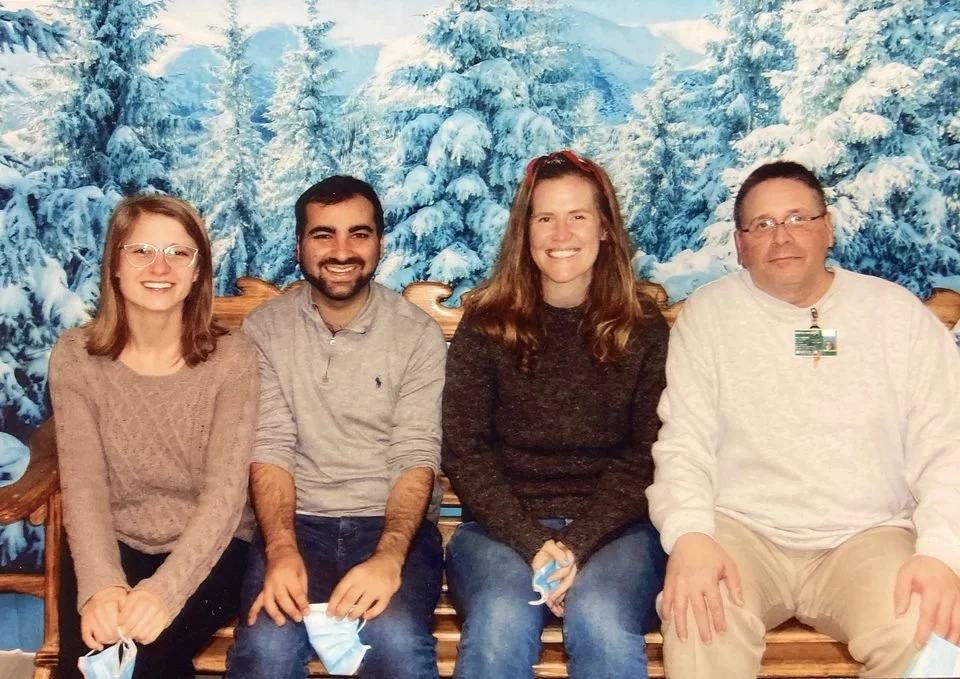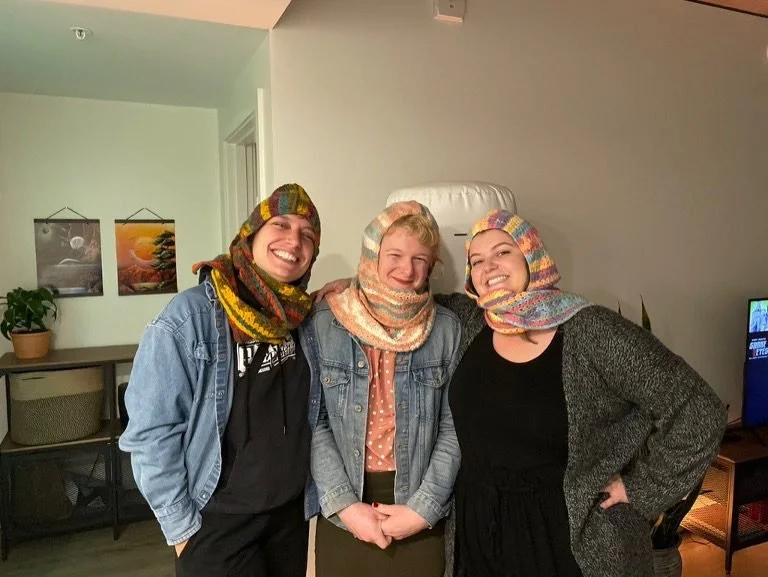Seattle University law students reflect on SCP volunteer experience
By Brooke Kaufman | Communications Specialist
From left: Jessamine Anderson, Elan Heissler, and Jen Dana-Farley with their client William “Billy” Martin.
In our last newsletter, we shared updates on the March clemency hearings. Seattle University School of Law students represented two of our clients, William “Billy” Martin and James “Hutch” Hutcheson. Billy was represented by Jessamine Anderson, Jen Dana-Farley, and Elan Heissler, with SCP’s Jennifer Smith supervising. Hutch was represented by Maddison Story, Madeline Pfeiffer, and Cait Nold, with SCP’s Willa Osborn supervising.
SCP’s mission has always been to match our clients with dedicated legal advocates who will work tirelessly to secure their freedom. These student volunteer teams were no exception. Both groups worked with Billy and James for several years, from the start of their law school careers to just months before graduation. In addition to forming close bonds with their clients, the students created lasting friendships with one another and developed a new outlook on the clemency process.
For some, volunteering on post-conviction cases was a natural step in their law school careers.
“Part of the reason why I came to law school is that I worked for the dog program at the Washington Corrections Center for Women and became friends with a person who was going up for clemency,” Cait said. “Eventually, I spoke at her hearing. When I saw there was an opportunity to work with the Seattle Clemency Project, I said absolutely.”
Although they didn’t know what the experience of volunteering on a clemency case would entail, Cait said, “From start to finish, we were along for the ride.” At the time, many of their experiences as a law student had felt “transactional” and limited by the formalities of the attorney-client relationship. With Hutch, they were able to develop a working relationship that transcended this formal boundary.
“I can’t speak highly enough of our little team,” Cait said. “We all kind of knew each other before starting [this case], but this has been the place where we have built relationships and [recognized our] similar understandings of how we want to engage with the criminal legal system.”
As they worked on Hutch’s petition, the students grappled with parts of the clemency process that seemed incongruent with its emphasis on redemption. As Cait described, something that permeated their work was “the heaviness and heartbreak of it all.”
“In this process, you’re having to make the argument that someone is exceptional and that they’re somehow different from other people who are in prison who deserve to be incarcerated,” Cait said. “That [argument] relies on constructing a legible narrative and a person being comfortable with judgment. [Judgment] lends itself to race, gender, trauma, and how these factors play out [in the context of a hearing]. Trauma, for one, affects how people communicate with others, how they’re read by others, and their ability to be read well. [Ultimately, the outcome of a clemency hearing] relies on a person’s ability to present themselves well and be articulate, which feels disgusting.”
Succeeding in an argument of exceptionality becomes even harder when you consider, like Cait said, “people are expected to make some form of an extraordinary transformation while they are in a place that makes that impossible.” Survival is the mentality of most people serving time in prison. Pair this with institutional standards for conformity and the influence of prison politics, and it’s hard to imagine someone with the tools and the safeguards to pursue any measure of success beyond mere survival. And yet, in every institution, people like Hutch are succeeding. They are overcoming barriers — to their personal growth, livelihoods, and futures — that people who aren’t incarcerated will never understand. How do you communicate this type of improbable success to a body like the Clemency & Pardons Board? If you ask Madeline, who worked alongside Cait, you take that story of success and reframe it as something clean, something that the board members can digest without guilt, agreeing that recommending clemency, in this exceptional case, is the right thing to do.
“[In clemency work], you get to dive into a person's experience with remorse and how, in some ways, they find closure,” Madeline said. “On the flip side, there’s something super icky about having to craft [a person’s story] in a certain way. There’s the story that is most resonant to me about why Hutch did what he did and why he’s sorry for it. That story is very different from the story we told the board, because we had to make [Hutch’s petition] palatable and packageable. There’s something that’s very emotionally vulnerable about the [clemency] process. And when you have to be strategic about something that’s emotionally vulnerable, that kills a part of you.”
Hutch’s petition was ultimately successful, and he received a 5-0 recommendation for clemency. As remarkable as this outcome is, it marks the beginning of a long road to freedom. The board’s recommendation now moves to the governor’s office, where a final decision on release will be made. There is no timeline for how long this process will take.
“When I got home [from the hearing], I immediately took a nap because I was so tired,” Cait said. “I cried a lot that weekend. It felt like a big win in so many ways.”
Even in their excitement for Hutch, Cait couldn’t help but think of the petitioners who hadn’t received the same outcome.
“I think [how I’m processing Hutch’s hearing] is both celebrating the win we did get and recognizing how devastating [the clemency] process still is,” Cait said. “It feels like we’re in this waiting period now, where we’re waiting for the bureaucracy and the political system to do something [with the recommendation]. It's hard to feel the tangibility of the win when there’s this holding pattern that we’re in. It’s a bittersweet feeling, reflecting on the cases that didn’t have the same outcome.”
Madeline describes her experience working with Hutch as “grounding” and something that affirmed her decision to attend law school. Her career path is rooted in a mentality of helping others; going through the clemency process and connecting with people like Hutch “made this goal seem less hypothetical.” Like Cait, though, she is struggling to weigh Hutch’s success against the outcomes of other petitions.
“When I compare Hutch’s case with those that the board didn’t [recommend clemency for], it’s heartbreaking and terrible,” Madeline said. “They all deserve freedom. [Since the hearing], I’ve had a similar experience [to Cait] of immediately crashing afterward and now experiencing this feeling of tension and release.”
From left: Cait Nold, Madeline Pfeiffer, and Maddison Story wearing their client James “Hutch” Hutcheson’s crochet creations.
Billy’s team had their own reflections on the clemency process. Despite an incredibly hard-fought case, Billy’s petition did not receive a recommendation for clemency. Both the outcome and its implications are things the students still grapple with. Jen said the team’s priority has been how Billy is processing the outcome.
“My priority wasn’t how I was processing it, but how he’s processing it because it’s not the outcome he wanted,” Jen said.
Something that’s stuck with Jen, Jessamine, and Elan is the concept of time and how it applies to Billy’s life versus their own.
“I remember doing the math in the beginning [of working with Billy] and realizing that I would be negative [years old] when he went into prison,” Elan said. “There hasn’t been a single day that I’ve been on this Earth that he’s been free. Every time we visited him [in prison], we walked out; since I’ve been alive, he’s never walked out.”
The students were always conscious of how long Billy had been in prison. His incarceration nearly 40 years ago happened when he was not much younger than Jessamine, Jen, and Elan are now.
“Billy has a daughter who’s about my age,” Jessamine said. “He brought up multiple times that I was his daughter’s age. I think it gave a little bit of context for how much he’s grown, and I think that the age aspect just made the situation even more heartbreaking for me because recidivism rates go down as people age. He went [into prison] when he was 21; that’s such a long time ago. I can’t even imagine that; his whole adult life [has been his incarceration].”
Jen agreed that being able to “just leave” after visiting with Billy put things into their harshest perspective. She described the experience as jarring, saying, “There’s no way for it to not be shocking... This person is almost 60, and they went into prison when they were 21.”
Despite the ups and downs, the students said they’d volunteer on another clemency case in the future. In the meantime, they’re focusing on finishing law school and figuring out what lies ahead. Not enough time has passed since the hearings for them to comprehend the full weight of what has been granted to Hutch or what has yet to be done for Billy. For over two years — most of their law school careers — they worked toward a singular goal, unearthing the triumphs and extraordinary efforts of two people whose lives had been overlooked. Time passed, circumstances changed, and lives developed in parallel. For the students, this experience is one chapter, but for Hutch and Billy, the fight for a second chance doesn’t end here. That fight began decades ago when Hutch and Billy committed themselves to change — not for clemency, but to affirm that every life, exceptional or overlooked, has a purpose. It’s a commitment that lasts a lifetime.


